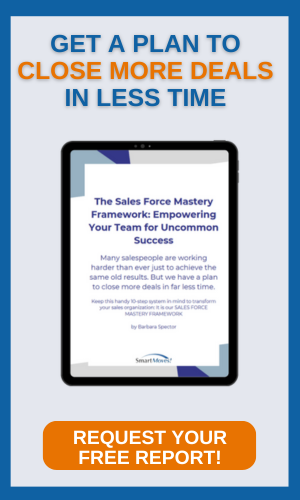
BY JAY FUCHS, HUBSPOT SALES BLOG EDITOR
Finding the right salesperson is like catching a butterfly.
But the butterfly can talk.
And it probably has work experience and people skills.
And it should know how to dress well.
And it has good body language.
And it would freak a lot of people out if it could fly.
Well, I got a lot less mileage out of the butterfly analogy than I thought I would, but there’s one key similarity between finding a butterfly and a great salesperson. Both can be really hard.
Hiring an exceptional salesperson is a tricky process. There’s no universal blueprint that lays out every step to do it successfully. It takes a lot of finesse and good judgment — with some pure luck peppered in every now and then. That being said, there are certainly some steps you can take to set yourself in the right direction.
In this article, I’ll outline what you should do to put yourself in the best position to find and hire a great salesperson.
1. Set terms for your ideal candidate.
When you’re hiring salespeople, you’re going to wade through a lot of applicants. And I’m not using the term “a lot” lightly.
According to the Jobvite 2019 Recruiting Benchmark Report, individual job requisitions in financial services received an average of 32 applicants each, while listings in information technology received 39.
And those figures may be considerably lower than what you could expect from your business. Run a quick search for “entry-level sales positions” in your area on LinkedIn. There’s a good chance you’ll find several listings with well over 100 applicants.
My point is, when hiring salespeople, you may have to wade through an ocean of resumes, so it’s important to know what you’re looking for.
Set terms for both your minimum and preferred qualifications for the position you’re trying to fill. Identify the relevant experience, education, and qualifications you’d like out of your ideal applicant. Use those to filter your applicant pool and only engage with prospective employees who are qualified to fulfill the responsibilities of the position.
2. Write a great job ad.
Once you’ve locked down what you want out of your ideal candidate, write a job listing that will resonate with that persona. If you want your job ad to register with the candidates you’re after, there are some things you have to be mindful of.
You need to optimize your job title to suit your target candidates. Try to hit keywords that they may be searching for, like “B2B” or “Entry-Level.” Don’t get carried away, though; you still want your title to be straightforward and convey the nature of the position.
After that, you need to write a compelling paragraph about what is in it for the candidate to work for you, how will she grow, what will he become or contribute. Also, give some insight into what your specific sales team does day-to-day. Describe the company’s perks and benefits package as well.
And set clear, realistic job requirements — enough to register with legitimately qualified candidates without scaring too many off.
Finally, use strong verbs to describe the job’s responsibilities. Using creative yet authoritative language — think “enabling success” as opposed to “overseeing projects” — can excite potential candidates and help motivate them to send an application your way.
3. Pick the right candidates for interviews.
Take notice of the most personal applications you receive. If you’ve asked for a cover letter, take the time to make sure it’s not just some generic document that an applicant has been blanket-sending to every post they see on LinkedIn.
You want candidates that want you back. A personal, compelling cover letter can tell you a lot about how much this opportunity means to an applicant. If they put in the time to write a thoughtful cover letter and tailor their resume to suit your job description, they probably took the chance to work for you seriously.
Once you’ve identified the best applicants, start running phone screens. Call your candidates and see if their previous experience is legitimate, if they took the time to learn about your company, and how quickly they can think when put on the spot.
After using your phone screens to narrow down your applicant pool, you may want to conduct remote interviews. These should be slightly more intensive phone screens, and generally, you’ll use them to identify the applicants you feel are best fit for in-person interviews.
4. Pay special attention to candidates who reach out before the interview.
Touching base with an interviewer before speaking with them in-person is usually a sign that a candidate is putting extensive effort into preparing for their interview. It’s also a great way for them to demonstrate the confidence and thoroughness they can bring to the table.
Reaching out to an interviewer before an interview is inherently imposing. Candidates are often put off by the prospect of coming off too pushy or saying the wrong thing. And, honestly, that could very well happen. There’s a real possibility that their effort to reach out could come off as hollow or unproductive.
But, if they ask the right questions — like if there are specific materials you’d like them to prepare, what the name of everyone their meeting with is, or what the appropriate dress code is — they’re showing that they’re diligent and self-assured enough to do their homework and power through uncomfortable situations.
5. Ask thoughtful questions during your interviews.
You need to get a feel for who these candidates are beyond their resumes. When conducting an interview, you don’t want to just mull through technical questions without challenging candidates to demonstrate how they think outside of a conventionally professional context.
That process can mean asking good interview questions like, “Tell me about a time you screwed up,” or, “If I were to poll everyone you've worked with, what percentage would not be a fan of yours?”
You want them to reflect on things that they can’t necessarily brag about. That will give you a feel for how they’ll function as both an individual employee and a part of your team. Remember, hiring a salesperson with excellent qualifications who won’t fit your company culture or team dynamic may be more trouble than it’s worth.
6. Make sure they ask thoughtful questions as well.
Asking thoughtful questions is a great way for an applicant to demonstrate critical thinking skills and a genuine interest in your company. By asking great questions, a candidate is demonstrating a willingness to try and understand your business. They’re also showing that they know how to ask for help when they get stuck.
A candidate that asks specific, meaningful questions that extend beyond facts anyone can find on your website often ends up being a sharp, dedicated salesperson.
7. Be thorough and transparent when describing what you need.
Let your candidate know exactly what they can expect from this role. You want them to understand what they’re getting into — for both their sake and yours. If you hire someone who doesn’t have a great grasp on what they’re getting into, there’s a chance they may only stick around for a few months.
Tell them about what the role entails. Tell them about what could be hard about it. Tell them about some pitfalls they might hit, and gauge their response. You don’t have to be ominous and imposing about it; you just have to be honest.
Unless you’re hiring someone for a contract position, you’re looking for a salesperson who’s in it for the long haul. You can’t know if a candidate is cut out for a position if they don’t know what that position really is.
8. Follow up with promising candidates quickly.
If a candidate nailed an interview, let them know right away. Reach out and keep them engaged and interested in your company and the role itself. Let them know that they impressed you and give some information on next steps.
A great sales candidate can be a hot commodity. If a candidate you’re interested in is interviewing for multiple positions at other companies, you want to stay on their mind as much as possible. Getting in touch and scheduling next steps is a great way to do that.
Once you’ve arranged next steps — which often means more interviews — keep repeating most of the process outlined above. You might want to bring in additional interviewers, arrange scenario-based interviews, have candidates give presentations, or make them do anything else to demonstrate their practical understanding of sales.
Like I said, there’s no definitive step-by-step outline of the sales hiring process, but following the steps above should set you on the right course.
However if you want a fool proof turnkey system to hire salespeople right from writing great ads to the final interview and everything needed in between, we have one for you. Click here to schedule a conversation about what you need.





